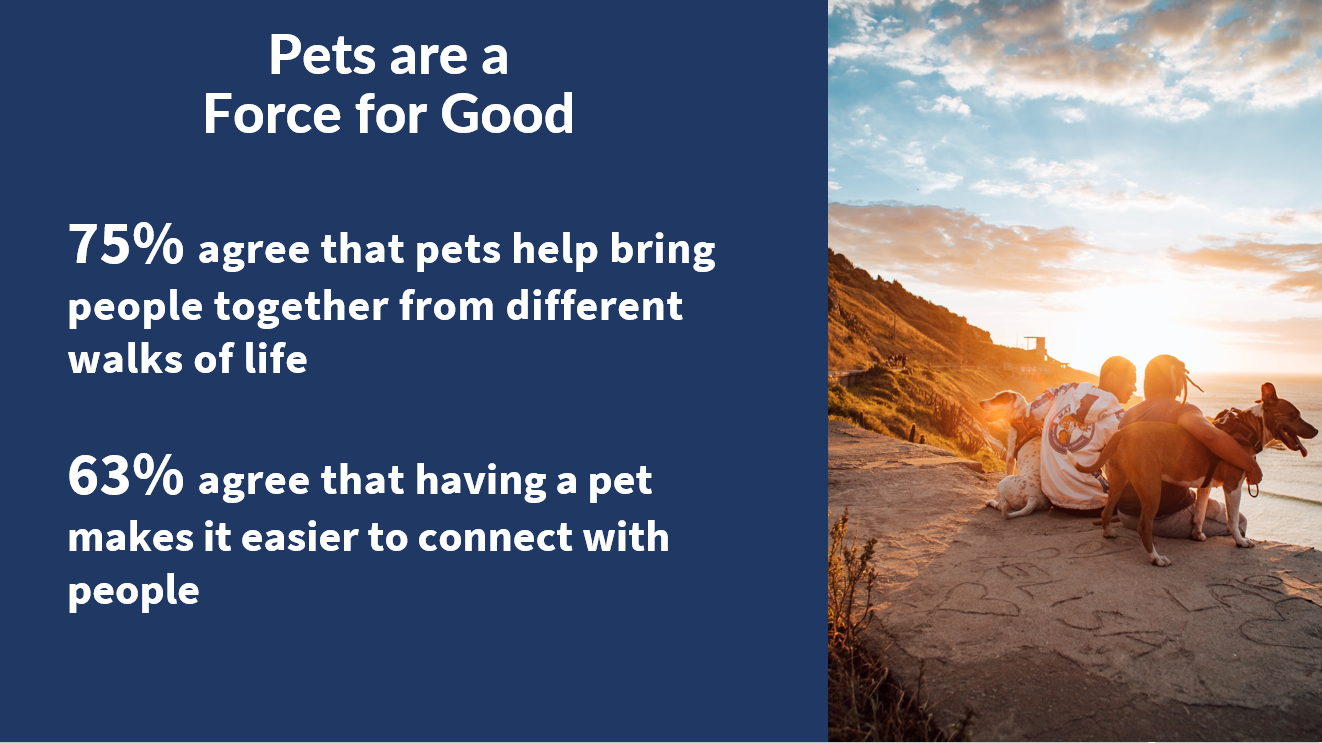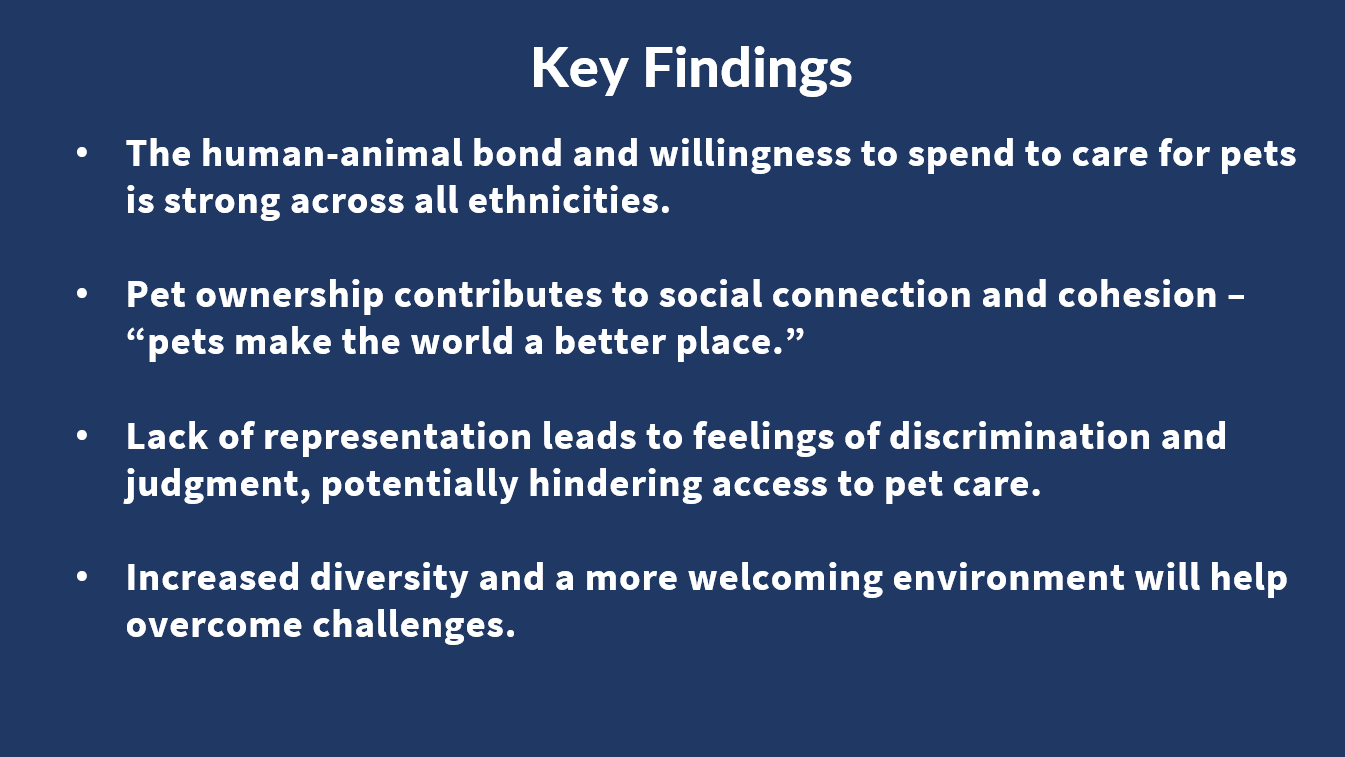The Human Animal Bond Research Institute (HABRI) and Petco Love commissioned the first survey of its kind to investigate how the human-animal bond is experienced among pet parents of color and how these groups interact with the pet care ecosystem.
Methodology
This survey was conducted online of 2,302 US adults aged 18 and older in January 2022. Participants are pet owners who are the primary person responsible for their pet’s care.
Key Findings
- The human-animal bond is strong across all ethnicities.
- Pet ownership contributes to social connection and cohesion.
- Lack of diversity may hinder access to pet care.
- Increased diversity, representation, culturally competent care and a welcoming environment will help overcome challenges and allow the pet care community to better serve pets everywhere.
The Human-Animal Bond

Across all ethnicities, pet parents have a close relationship with their pets – they are viewed as family or children.
- My pet is part of my family..………………………………………………………………………………………………………………….91%
- My pet makes me laugh…………………………………………………………………………………………………………………………90%
- I spend time playing/interacting with my pet every day………………………………..88%
- I’d take any intervention to prevent my pet from pain & suffering………88%
- Nothing would ever convince me to give up my pet………………………………………….85%
Strong Commitment to Pet Health & Care
35% of all pet parents say “money is no object” when spending on pets

Other category consists of Native American, Pacific Islander, Indian and Middle Eastern pet owners.
Pet parents across all ethnicities on average visit the vet twice a year. Income is the primary driver of not having a veterinarian and the primary reason for not visiting the veterinarian.
Pets are a Force for Good

Pets build community, making it easier for us to connect with and talk to one another
- 75% agree that pets help bring people together from different walks of life
- 63% agree that having a pet makes it easier to connect with people
- 60% say they are more likely to talk to other people of other walks of life with their pet
- 54% agree having a pet makes it easier to connect with neighbors
Pet Parents across all ethnicities have experienced improvements in mental/physical health
- 83% of pet parents have experienced improved mental health from owning a pet
- 70% of pet parents have experienced improved physical health from owning a pet
Barriers & Challenges Faced by Pet Parents of Color
Not everyone experiences the pet care ecosystem equally. The survey asked about people’s experiences with the pet care ecosystem, including when visiting the veterinarian, pet stores and animal shelters/rescues.
Veterinary Care
Lack of diversity is seen as a challenge that can hinder access to veterinary care for pet parents of color:
- 61% of pet parents of color agree that veterinarians/veterinary clinics are doing a good job serving their racial/ethnic group
- 53% of pet parents of color agree that it is important that veterinarians and their staff members reflect the racial/ethnic diversity of the communities they serve
- 34% of pet parents of color say that racial/ethnic minorities have a harder time getting the veterinary care they need
1 in 5 pet parents had a negative experience when visiting a veterinarian:
- Black and Latinx pet parents were more likely to report that they experienced discrimination.
- Black and Latinx pet parents were more likely to report they were treated as naïve/uniformed
- Black and Latinx pet parents were more likely to report that they were judged by staff or other customers
Black and Latinx pet parents would be more likely to visit veterinary clinics that deliver culturally competent care (welcomed them, listened to them, and treated them with respect and empathy) and have more diverse staff and customers.
Pet Stores
Lack of diversity in pet stores is seen a challenge that can hinder access to pet supplies for pet parents of color:
- 61% of pet parents of color agree that pet stores are doing a good job serving their racial/ethnic group
- 50% of pet parents of color say that lack of diversity in pet stores is a problem
- Black pet parents were more likely to have negative experiences at pet supply stores
- 33% of Black pet parents with a negative experience at a pet supply store reported they were judged by staff or other customers, 25% reported being discriminated against
- 27% of Latinx pet parents that had a negative experience at a pet supply store reported being treated as naïve/uninformed
Pet parents of color are more likely to visit pet supply stores with diverse, inclusive environments. Spanish-speaking Latinx pet parents want access to veterinary care.
Animal Shelters/Rescues
Lack of diversity in animal shelters/rescues is seen as a challenge that can hinder access for pet parents of color:
- 68% of pet parents of color agree that animal shelter organizations are doing a good job serving their racial/ethnic group
- 30% of pet parents of color state that animal shelter organizations they have visited don’t have diverse employees
- 28% of pet parents of color state that racial/ethnic minorities have a harder time adopting pets from animal shelter organizations
- Black (36%) and Latinx (38%) pet parents were most likely to agree with this statement
1 in 5 (22%) of Black pet parents reported having a negative experience at an animal shelter/rescue
- 36% of Black pet parents that had a negative experience reported that they were treated as naïve/uniformed
- 36% of Black pet parents that had a negative experience reported they were discriminated against
Black and Latinx pet parents would be more likely to visit an animal shelter/rescue that has more diversity among employees and clients. Spanish-speaking Latinx pet parents are more likely to visit an animal shelter that provides access to veterinary care.
Overcoming Challenges
Wherever they interact with the pet care ecosystem, pet parents across all ethnicities have the same top criteria for pet care services: Cost, Convenience, Friendliness and Expertise.
Aside from core consumer preferences, pet parents of color report that they want to be welcomed and treated with respect in pet care interactions.
Diversity of staff is an important consideration in all settings. In addition, languages spoken are particularly important to Spanish-speaking Latinx pet parents.

HABRI and Petco Love are committed to diversity, equity, inclusion and belonging in the pet care ecosystem.
For more information from the survey, please contact info@habri.org.





